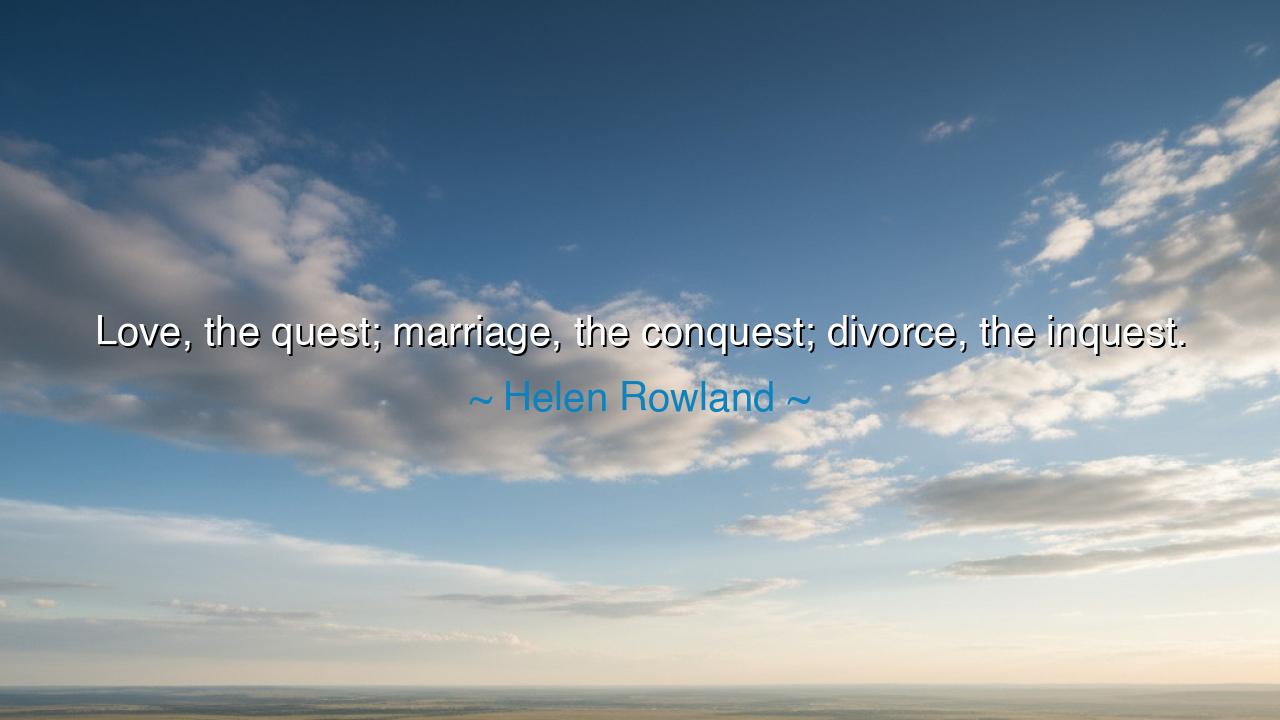
Love, the quest; marriage, the conquest; divorce, the inquest.






In the grand narrative of human relationships, there exists a powerful, cyclical journey—a journey that begins with the fiery passion of love, passes through the complex battlefields of marriage, and sometimes ends in the solemnity of divorce. Helen Rowland, in her incisive words, captures the essence of this journey: "Love, the quest; marriage, the conquest; divorce, the inquest." These words, like arrows piercing the veil of conventional thinking, remind us that each phase of a relationship is a different stage, marked by its own struggles, victories, and introspections. The quest, the conquest, and the inquest—each is a chapter in the human story of love, commitment, and ultimately, separation.
To understand this, we must first delve into the meaning of love—the quest. Love, in its purest form, is the search, the longing, the desire for something beyond oneself. It is the pursuit of connection, of intimacy, of sharing one’s heart with another. The quest of love is an eternal journey—one filled with excitement, discovery, and the wild hope that we may find that which completes us. In the ancient world, Homer's tales of Odysseus speak of this search, as the hero journeys not just across seas but through the very heart of the human condition. His quest is not just for home but for meaning and belonging. Similarly, in love, we embark on a journey to find a connection that transcends the ordinary and touches the sacred.
Yet, as Rowland suggests, love is but the beginning. When love transforms into marriage, the pursuit of connection becomes a battle, a conquest. Marriage is the realm where the ideal of love meets the reality of human existence. It is a contract forged not just in passion, but in commitment, sacrifice, and effort. The ancient Greeks recognized this in their depictions of Hera and Zeus—gods whose marriage was both powerful and tumultuous. It was not only a union of love but one where power, loyalty, and even jealousy played significant roles. In marriage, love must evolve into something stronger, more resilient, and more enduring. This phase is where the couple learns to navigate the challenges of daily life, where conflict and compromise often clash, and where the strength of the initial passion is tested by time.
In contrast, the solemn inquest of divorce brings with it a different truth—one of reflection, mourning, and sometimes, regret. Divorce is the point where the promises of love and the struggles of marriage culminate in the painful realization that not all unions are meant to last. It is an inquest into what went wrong, into the disintegration of something that was once whole. Socrates, though never married, often pondered the nature of relationships, reflecting that the human desire for connection is often at odds with the complexity of human nature. Relationships, he suggested, can fail not because of a lack of love, but because the ego and the selfishness inherent in all of us often obscure the true nature of what we seek in one another. In divorce, we examine, we question, we seek understanding, but we are left with the residue of a relationship that once promised eternal union but now reflects the fragility of human ambition.
The tale of King Henry VIII and his marriages provides a poignant example of this cycle. Henry’s first marriage to Catherine of Aragon began as a union of love, or so it seemed. But as the years passed, love was replaced with ambition, and the conquest of a legitimate male heir turned into a struggle that led to the downfall of a queen. His quest for a male heir, his ambition, and his desires led to divorce, and the inquest began—the questioning of his own decisions and the very foundations of his reign. Each marriage Henry undertook thereafter, each conquest of love, ended in its own inquest, each marked by reflection, failure, and regret. The cycle of love and its dissolution is eternal—echoing the struggles of the heart and the mind in the face of human fallibility.
From Rowland’s words, we draw a vital lesson: love, marriage, and divorce are all part of the same journey—a journey that we must navigate with awareness, courage, and humility. Love may begin as a quest, an ideal to be pursued with passion, but marriage demands of us a far deeper commitment and sacrifice—a conquest of our own desires for the good of another. Divorce, though painful, is not an end but an inquest, an opportunity for introspection and understanding, a moment to learn and grow from the past. It is in this cycle that we find the true nature of love—that it is not static but ever-evolving, constantly challenged, and, at times, broken, but always worth the journey.
Therefore, let us embrace these stages of the heart with understanding. Let us know that love is a quest worth pursuing, that marriage is a battle worth fighting, and that divorce, though painful, is a chance for renewal, for the soul to search for clarity. May we enter each phase with honor, not just toward our partner but toward ourselves, knowing that the deepest lessons of life come from the relationships we forge, the choices we make, and the paths we walk. For in love, marriage, and divorce, we find the true measure of the human experience—a journey of growth, transformation, and ultimately, understanding.






AAdministratorAdministrator
Welcome, honored guests. Please leave a comment, we will respond soon